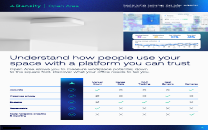
Density
Founded Year
2014Stage
Series D | AliveTotal Raised
$217.2MValuation
$0000Last Raised
$125M | 3 yrs agoMosaic Score The Mosaic Score is an algorithm that measures the overall financial health and market potential of private companies.
+71 points in the past 30 days
About Density
Density provides sensors and software designed to measure and improve workspace utilization by offering insights into occupancy and space usage. Density serves sectors that require space management and optimization, such as corporate offices and commercial real estate. It was founded in 2014 and is based in San Francisco, California.
Loading...
Density's Product Videos


ESPs containing Density
The ESP matrix leverages data and analyst insight to identify and rank leading companies in a given technology landscape.
The workforce tracking sensors market provides advanced solutions for monitoring and optimizing workforce efficiency and safety. Workforce tracking sensors refer to sensors and devices that collect real-time data on employee activity and movement in the workplace. Providers typically focus on non-desk employees in factories or operations. These solutions can help organizations identify bottlenecks…
Density named as Challenger among 7 other companies, including Intenseye, RealWear, and Aatmunn.
Density's Products & Differentiators
Atlas
Atlas is a platform that gives companies with vast amounts of square footage the ability to measure, understand and contextualize their spaces with accuracy and granularity in a streamlined, easy-to-navigate way.
Loading...
Expert Collections containing Density
Expert Collections are analyst-curated lists that highlight the companies you need to know in the most important technology spaces.
Density is included in 4 Expert Collections, including Unicorns- Billion Dollar Startups.
Unicorns- Billion Dollar Startups
1,261 items
Smart Cities
3,446 items
Sales & Customer Service Tech
767 items
Companies offering technology-driven solutions for brands and retailers to enable customer service before, during, and after in-store and online shopping.
Semiconductors, Chips, and Advanced Electronics
7,309 items
Companies in the semiconductors & HPC space, including integrated device manufacturers (IDMs), fabless firms, semiconductor production equipment manufacturers, electronic design automation (EDA), advanced semiconductor material companies, and more
Density Patents
Density has filed 4 patents.
The 3 most popular patent topics include:
- 3d imaging
- data management
- design of experiments

Application Date | Grant Date | Title | Related Topics | Status |
|---|---|---|---|---|
11/6/2023 | 5/28/2024 | Grant |
Application Date | 11/6/2023 |
|---|---|
Grant Date | 5/28/2024 |
Title | |
Related Topics | |
Status | Grant |
Latest Density News
Feb 10, 2025
Business Insider Share Impact Link Some employers use distance in deciding how often workers must report to an office. Bim/Getty Images This story is available exclusively to Business Insider subscribers. Become an Insider and start reading now.Have an account? Log in Some employers require time in the office based on how far away a worker lives. One company in San Francisco paid remote workers to move closer so they could report to the office. Some employers are sticking to hybrid setups even as some big names mandate a return to the office. Oliver Shaw's commute to the office is 190 miles and takes more than 2 hours. And "I am absolutely fine with it," he told Business Insider. The CEO of the software company Orgvue travels by train from his home near Manchester, England, to London, generally on Tuesdays. Shaw often then stays overnight near the office, takes a return train after work the next day, and gets back home at about 10 p.m. What's not fine, however, in Shaw's view, is to say that those who live far from the office — like he does — get out of having to commute at least some of the time. Yet, at many employers, that's what happens: Live close to the office , show up. Live far away, stay remote. Where the boundary lies, however, is often unclear. Late last month, Dell CEO Michael Dell said that starting in March, the company would expect workers living within roughly an hour of an office to show up five days a week. A spokesperson told BI that guidance remains in effect. Meantime, the federal government is giving different consideration, at least initially, to workers living more 50 miles from an office. The real estate company Redfin has drawn the mark at 20 miles. Last year, IBM moved to require managers in the US to live within 50 miles of an office or a client site. Stay inside the line In 2024, Density, a Bay Area company that makes radar sensors for anonymously monitoring office space use, offered relocation assistance to most of its remote workers so they could regularly report to its main office in San Francisco. "By and large, if you didn't relocate, then you found another job," cofounder and CEO Andrew Farah said. "We take a reasonably hard policy on it." Since January, Density has required workers who live within 30 miles of its San Francisco office to be in four days a week — Wednesdays are a work-from-anywhere day — from 10 a.m. to 3 p.m. That's an extra in-office day from 2024. Workers who live beyond 30 miles now have to show up two days a week, up from one last year, he said. New hires, regardless of where they live, must travel to the office four times a week. Farah said it made sense for the company to revise its pandemic-era policy of allowing remote work. He credited Density's employees for dealing with the changes even if they didn't always like them, as indicated in a survey of the firm's some 100 workers. Yet the same survey also found a 48% increase in workers who agreed with the statement, "I feel more aligned with the company," Farah said. Farah said the move to require workers to show up more was also designed to boost key metrics like sales and the speed at which Density develops products. "When we went from fully distributed to in-person, they all got better," he said. Many employers still allow flexibility Big-name companies, from Amazon to JPMorgan , have required many desk workers to be back in the office five days a week. Yet many others have maintained flexible policies or offer RTO guidance but don't draw a circle around the office to determine who has to come in, Brian Elliott, a former executive at Slack who is CEO of Work Forward, an advisory firm on future-of-work issues, told BI. Such employers will say, "We want you all to be together, but I'm not going to enforce it through monitoring," he said. In some cases, Elliott said, employers are using "questionable logic" when implementing RTO policies . He said that before they settle on a line of demarcation, employers would be wise to determine which teams are located in the same areas so that people who work closely together might meet in person regularly. Most workers would understand the need for that, he said. Yet, Elliott said, asking those who might do half of their work or more with people in other locations to show up often strikes employees as illogical. "You're basically commuting to the same thing you would have been doing at home," Elliott said. Opening an office but going hybrid Prodoscore, which makes software for monitoring employee productivity, has operated as a remote company though it plans to open an office in Boston for some functions, CEO Sam Naficy told BI. Yet even when there's an office to go to, he said, the company will rely on a hybrid setup . That's already what it does by gathering teams each month to help build culture. Naficy said he believes many companies are too quick to call workers back to the office based on "gut feelings" and insufficient data. "It's a Band-Aid solution," he said. Instead, Naficy said, employers should consider setups that allow for worker flexibility, provided they're held accountable for their accomplishments. Otherwise, he said, there will likely be a group of workers who think, "Hey, I am equally productive. Why are you forcing me to drive an hour a day?" For Shaw, the head of Orgvue, being in the office a couple of days a week when he's not otherwise traveling gives him a chance to collaborate with his executive committee and the wider team, he said. Plus, Shaw said, time in the office affords workers a chance to be productive together. "I'm not managing staff in a Victorian way of being in this place for this many hours. I'm managing a set of outcomes," he said. Read next
Density Frequently Asked Questions (FAQ)
When was Density founded?
Density was founded in 2014.
Where is Density's headquarters?
Density's headquarters is located at 2 Bryant Street, San Francisco.
What is Density's latest funding round?
Density's latest funding round is Series D.
How much did Density raise?
Density raised a total of $217.2M.
Who are the investors